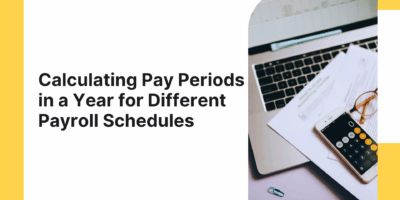
What is Retro Pay?
When payroll errors can happen, there are ways for employees to get their money from the employer. Discover what retro pay is, how it happens, the differentiation from back pay, and its effect on taxes.

As we move towards digitalization, more and more organizations are considering automated payroll systems. This automation financial management technology allows employers to process payroll digitally, making financial tracking seamless.
Almost every organization uses this financial tracking solution, from small businesses to large companies.
So, what is an automated payroll system? It’s a program designed to manage and track employee payments (payroll). This program automates the payment process freeing the HRs from several tasks such as planning and budgeting.
Organizations need a top-notch and reliable payroll system for digital financial tracking, eliminating the odds of manual errors.
Automated Payroll Systems Features
Payroll automation is not just about paying the employees. It brings various features to the table to help organizations streamline their financial activities. Following are some automated payroll system features:
Time tracking integration
Many small businesses hire part-time employees who work on an hourly basis. Automated payroll systems track their hourly activity and eliminate the need for manual entry. This improves the overall efficiency of the organization and reduces manual error.
Direct deposit
Distributing paychecks manually can take a toll on HRs. It is a time-consuming task that automated payroll systems can simplify.
Financial management
Payroll systems can effortlessly create digital payroll reports. This can help an organization streamline its finances, making an automated payroll program vital for businesses.
Wage deductions
Wage deduction is crucial for businesses as they want to pay a fair amount to their employees.
When integrated with time tracking software, an automated payroll system creates the paycheck the employees are entitled to.

Among multiple types of automated payroll systems, these are the most common ones:
Automated payroll systems for small business benefits small-sized organizations in various ways. With an automated payroll process, HRs no longer have to dedicate their time to distributing paychecks. This saves time they can use in other crucial tasks.
A payroll system also reduces the cost of hiring a payroll manager. The software will perform multiple tasks in one go.
Payroll programs that are designed for startups can assist the company in several ways, and here are some of them.
Since a startup needs time and funds to progress, an automated payroll system becomes a necessity.
Automated payroll systems streamline payroll processes, reduce errors, and save time for growing businesses. Features such as automatic wage calculations, tax deductions, and direct deposit simplify payroll management.
Scalability ensures system growth with expanding employee numbers. Moreover, enhanced compliance, data security, and reporting enable efficient payroll operations, supporting business growth.
|
Advantages of Automated Payroll Systems |
Disadvantages of Automated Payroll Systems |
|
1. Time-saving: Automated payroll systems can significantly reduce the time required to process payroll. They automate calculations, tax deductions, and paychecks generation, saving hours or even days of manual work. |
1. Initial setup and cost: Implementing an automated payroll system requires an upfront investment in software, hardware, and training. This initial cost can be a barrier for small businesses with limited budgets. |
|
2. Accuracy and compliance: Automated systems minimize the risk of human error in payroll calculations. They can accurately calculate wages, deductions, and taxes based on predefined rules and regulations, reducing the likelihood of mistakes and compliance issues. |
2. Technical issues: Automated payroll systems may experience technical glitches or downtime like any software. This can lead to delays in processing payroll and potential frustration for employees and HR personnel. |
|
3. Increased efficiency: With automated systems, HR personnel can streamline their processes and focus on more strategic tasks rather than repetitive manual calculations. It allows them to allocate their time and resources more effectively and, thus, improve productivity. |
3. Lack of customization: Some automated payroll systems may lack flexibility in accommodating specific payroll requirements or unique company policies. This can be a limitation for businesses with complex payroll structures or specific needs. |
|
4. Enhanced security: Automated payroll systems often provide robust data security measures, including encryption and access controls, to protect sensitive employee information. They can minimize the risk of data breaches and unauthorized access to payroll data. |
4. Learning curve: Adopting an automated system may require employees to learn new software and processes. This learning curve can be challenging for some individuals, especially for those less tech-savvy or resistant to change. |
|
5. Reporting and analytics: Automated systems can generate various reports and analytics related to payroll, such as tax reports, time and attendance data, and labor cost analysis. These insights can help businesses make informed decisions and improve financial management. |
5. Dependency on technology: Relying on an automated system means being dependent on technology. If the system malfunctions or experiences issues, it can disrupt payroll operations and create delays in paying employees accurately and on time. |



Every business has multiple areas that are crucial to work on for the organization’s progress. However, the monthly or weekly payroll process takes much of HR’s time. Consequently, they cannot pay attention to other vital organizational growth activities.
By introducing payroll-managed services, HRs can focus on other business areas that can help the organization grow. These automated programs remove the burden of wage and tax calculation, payroll distribution, finance management, and more.
The authorities can pay more attention to tasks such as hiring the right candidate or improving the work culture. This streamlines businesses’ core processes, allowing them to enhance overall functioning.
For HR professionals seeking to upskill in advanced payroll automation, earning a machine learning certificate can enhance understanding of AI-driven tools and streamline key financial processes.
Introducing payroll-managed services will save the organization time and help manage and track its finances. Therefore, the requirement for reliable payroll services can benefit every industry.
As far as the cost of payroll services is concerned, it varies depending on the service provider. Thus, finding a reliable service provider who offers top-notch assistance without burning a hole in the pocket is essential.
Outsourcing payroll services must be done after a thorough research. There are so many service providers in the market but not all of them are reliable. Here are some factors to consider when finding a reliable:
Automated payroll systems constantly evolve to provide users with the finest experience. The upcoming payroll trends are expected to make HR’s duties even more seamless.
Artificial intelligence is taking over the world to make our tasks effortless, and payroll systems are no exception. Ai is expected to enhance the automation of payroll processes, enhancing the organization’s overall efficiency.
To build internal capability, HR and finance teams can upskill with practical machine learning courses and pursue a machine learning certificate to evaluate AI payroll vendors, pilot anomaly detection for time and attendance, and govern data pipelines for accuracy and compliance.
Adherence to financial laws and regulations holds utmost importance when considering payroll systems. With advancements in these tools, automated compliance has become deeply integrated into the software.
Modern payroll software relies on data-driven processes, accessing all relevant information required for maintaining compliance. Given the frequent changes in taxes, wage rates, and laws, real-time updating is a crucial feature for payroll software.
Many small-sized and large organizations are hiring gig-based employees. These employees’ payments are not fixed and are instead based on various factors such as the number of working hours.
Modern automated payroll solutions allow the organization to maintain the paycheck distribution of gig-based employees. These automated payroll programs are tailored for independent contractors’ payroll processing.

Selecting the most suitable automated payroll system for the organization can offer numerous benefits:
By choosing an automated payroll system tailored to business needs, companies can streamline payroll operations, enhance accuracy, ensure compliance, and drive productivity and cost-efficiency within the organization.
Automated payroll systems offer numerous advantages for businesses seeking to streamline their financial tracking and payroll processes. These systems save time by automating calculations, tax deductions, and paycheck generation, reducing the need for manual work.
They improve accuracy and compliance, minimizing the risk of errors and ensuring adherence to regulations. The increased efficiency allows HR personnel to focus on strategic tasks while robust data security measures protect sensitive employee information.
Additionally, automated systems generate reports and analytics, provide features like time tracking integration and direct deposit, and offer scalability for growing businesses.
However, it is crucial to consider the potential drawbacks, such as the initial setup cost, technical issues, employee learning curve, customization limitations, and dependency on technology.
Despite these challenges, the benefits of automated payroll systems outweigh the disadvantages, and businesses can mitigate risks by selecting reliable providers and investing in proper training and support.
Ultimately, organizations can optimize their payroll processes, improve accuracy, ensure compliance, and enhance productivity and financial management by choosing the automated payroll system suited to their needs.
The future of automated payroll systems looks promising with trends like artificial intelligence and increased compliance integration, promising further advancements and efficiencies in the field.
Disclosure: Some of the products featured in this blog post may come from our partners who compensate us. This might influence the selection of products we feature and their placement and presentation on the page. However, it does not impact our evaluations; our opinions are our own. The information provided in this post is for general informational purposes only and should not be considered as legal, tax, accounting, or investment advice. For advice on specific issues, please consult with a qualified professional.
Browse our curated list of vendors to find the best solution for your needs.
Subscribe to our newsletter for the latest trends, expert tips, and workplace insights!

When payroll errors can happen, there are ways for employees to get their money from the employer. Discover what retro pay is, how it happens, the differentiation from back pay, and its effect on taxes.

Nearly half of Americans live paycheck to paycheck. Could switching to bi-weekly pay be the financial help your employees need?

Payday might feel like just another date on the calendar, but it’s the difference between stability and stress for millions of employees.

Learn more about the free payroll tools small business owners can use to save hours and grow their business.
Used by most of the top employee benefits consultants in the US, Shortlister is where you can find, research and select HR and benefits vendors for your clients.
Shortlister helps you reach your ideal prospects. Claim your free account to control your message and receive employer, consultant and health plan leads.